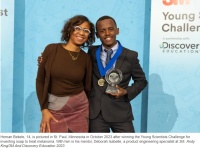Jessica Daniels
blackdoctor.org
(Black PR Wire) In a world where young minds are constantly pushing the boundaries of science, one exceptional 14-year-old from Annandale, Virginia, has made a significant breakthrough. Heman Bekele, a ninth-grader with a passion for biology and technology, recently clinched the title of “America’s Top Young Scientist.” His remarkable achievement was the development of a soap aimed at treating skin cancer, specifically melanoma, a type of skin cancer known for its aggressive nature.
The 3M Young Scientist Challenge
Bekele’s journey to becoming “America’s Top Young Scientist” involved months of hard work, dedication, and innovation. The 3M Young Scientist Challenge, a prestigious middle school science competition, provided the perfect platform for young scientists like Bekele to showcase their groundbreaking ideas. The competition targeted students between the fifth and eighth grades, encouraging them to come up with innovative concepts that could make a positive impact on the world.
Heman’s groundbreaking invention not only earned him the prestigious title but also came with a substantial $25,000 cash prize. He was officially crowned as the young scientist champion in St. Paul, Minnesota, in October 2023.
Heman Bekele’s Remarkable Invention
Bekele’s innovative soap was created to combat melanoma, a type of skin cancer that has seen a significant rise in the United States over the past few decades. Melanoma is known for its aggressiveness and life-threatening potential if not detected and treated early.
Bekele’s compound-based soap is both cost-effective and potentially life-saving. The manufacturing cost for one bar of this soap is just around $0.50. This affordability could make a significant difference, particularly for underserved communities, which often face barriers in accessing quality healthcare.
“I believe that young minds can make a positive impact on the world,” Heman said in his submission for the award.
“I have always been interested in biology and technology, and this challenge gave me the perfect platform to showcase my ideas,” he added.
Bekele’s Future Vision
Bekele’s ambition extends beyond winning the prestigious award. He aspires to refine his invention and establish a non-profit organization dedicated to distributing the soap to communities in need over the next five years. This visionary approach aims to address the critical issue of skin cancer within marginalized communities, where awareness and access to healthcare resources are limited.
Skin Cancer and Its Impact on the Black Community
Skin cancer is a global health concern, and its impact on various communities, including the Black community, is substantial. In the United States, skin cancer cases have been on the rise over the past few decades. According to the National Cancer Institute, the rate of new cases increased to 24.1 per 100,000 people in 2019, compared to 14.6 in 1992. This surge in skin cancer diagnoses underscores the importance of Bekele’s innovative solution.
The impact of skin cancer on the Black community is particularly noteworthy. While people with darker skin tones are less susceptible to skin cancer than those with lighter skin, melanoma, the most deadly form of skin cancer, often goes undetected in people of color until it reaches an advanced stage. Consequently, late-stage melanoma is more prevalent among Black individuals, leading to poorer survival rates.
Heman Bekele’s groundbreaking invention has the potential to address this health disparity by offering an accessible and cost-effective solution that can be particularly beneficial to underserved communities, including the Black community.
Skin cancer often has no symptoms in its early stages, however, symptoms can appear at any point, according to MD Anderson Cancer Center.
If you notice any of the following symptoms, it is important to let your doctor know so that you can get an infinitive diagnosis:
- A new spot on the skin or
- A changes in the size, shape or color of an existing spot. These changes can vary greatly so there is no one way to describe how a skin cancer looks.
- A spot that is itchy or painful
- A non-healing sore that bleeds or develops a crust
- A red- or skin-colored shiny bump on the top of the skin
- A red rough or scaly spot that you can feel
- A growth with a raised border and central crust or bleeding
- A wart-like growth
- A scar-like growth without a well-defined border

